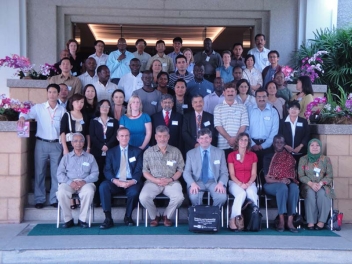 I am currently completing a three month secondment from Age UK to HelpAge International’s East Asia Pacific Regional Development Centre in Chiang Mai, and have been very lucky to have had my time here coincide with their annual Social Transfer Course.
I am currently completing a three month secondment from Age UK to HelpAge International’s East Asia Pacific Regional Development Centre in Chiang Mai, and have been very lucky to have had my time here coincide with their annual Social Transfer Course.
This is a two week programme that HelpAge runs each year with the Economic Policy Research Institute based in South Africa, and Maastricht University.
This year, 42 participants from 19 countries attended to learn the skills required for appropriate identification, design and implementation of social protection programmes. I was very fortunate to attend some of the highlights.
Importance of social protection
The course opened with a very interesting question “Why Social Protection?” from Professor Jomo Sundaram, Assistant General Secretary for UN DESA. His session highlighted its importance for addressing income equality, its benefit on education and preventative health. The lecture opened up some of the debates that the next two weeks promised.
The next step was a series of technical skills training in how to design and implement social transfer programmes. I joined the group for a great presentation from Dr Gian Thanh Long from Vietnam, on the use of macro-simulation in the design of social transfer schemes.
It was very impressive to see the range of estimates that could be generated in relation to different targeting and implementing systems from original data on a country.
Role played by older people in providing for their families
From an ageing perspective, I was particularly struck by the impact that cash transfers to older people could have on poverty reduction across the population. It proves the significant role of older people in their families and communities.
The highlight of the course for me was Dr Stephen Kidd’s presentation on the politics of social protection. Dr Stephen Kidd is a consultant on social transfers in developing countries and was also former Head of Policy at HelpAge International and former Head of Social Protection at DFID.
His presentation allowed thinking about the political negotiations involved in social protection and also the different approaches to implementing programmes.
This was really helpful in understanding the broader political narratives of social protection and how they interact with different types of government around the world.
It also provoked a great deal of debate in the group giving insight into the range of perspectives that people come to this issue with.
Excellent mix between learning and collaborating
Overall, I was incredibly impressed with the course which was packed with a range of international experts, skilled professionals and leaders in the field. The calibre of the attendees was equally high, with policymakers and government officials, representatives from bilateral and multilateral agencies, programme practitioners and staff members from NGOs from all over the world.
From speaking to a range of participants, it was this mix between learning from experts and collaborating with colleagues that contributed to the hugely positive experience of the course.
Describing his experience, Le Minh Hai from Vietnam, said: “For me, this has been a very useful course because it has provided me with up-to-date knowledge of social protection.
“We attended this course to share and exchange information on social programmes we have implemented and it’s helped us to get a better understanding of something we’ve been working on for many years.”
A huge learning experience
Having an eye in both camps gave me huge appreciation for the incredible organisation that pulling together a course like this required. It’s an amazing testament to the work of the whole team in Chiang Mai, and the hours they’ve all devoted to planning and delivering it.
In addition to all the lectures, training, workshops, and field visits, the team also managed to organise cultural activities and entertainment including elephant riding and rafting. All in all, it was a huge success and one I feel incredibly lucky to have been able to participate in.
Despite only finishing the 2011 course on Friday, planning for the social protection course 2012 is already underway! I’m already trying to work out how I can be sent on it.
If you or anyone you know is interested in being kept up-to-date on course details for next year, you can email asiacourse@helpageasia.org.
